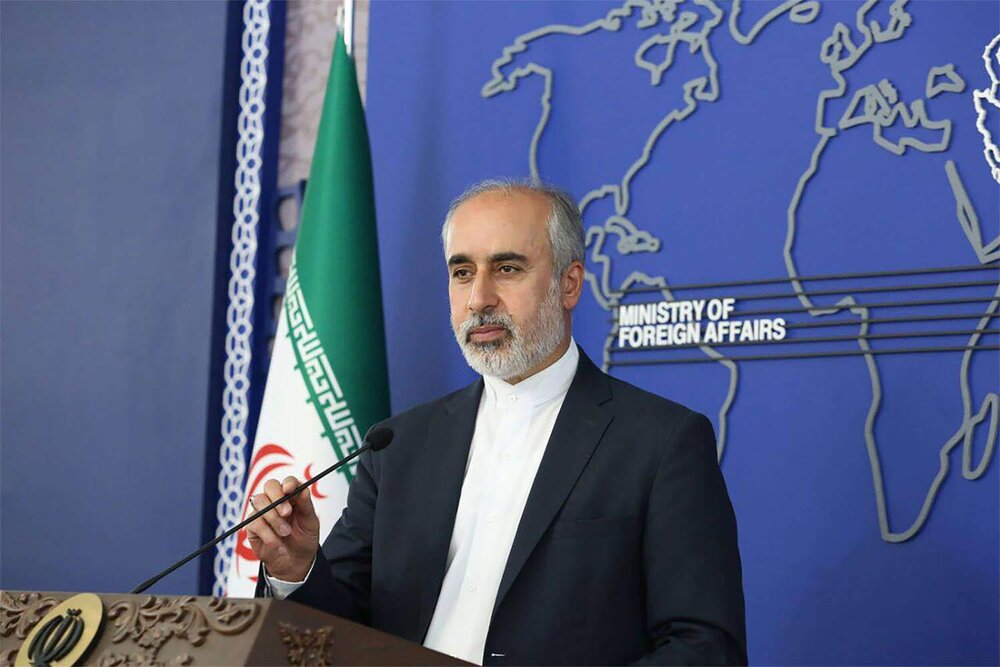Islamic Revolution is prevailing discourse: Foreign Ministry

TEHRAN- The Islamic Revolution's message of religious democracy and identity, which reached the ears of the whole globe, is described by the spokesman for Iran’s Foreign Ministry as the prevailing discourse in the region.
Speaking in his weekly presser on Monday, Nasser Kanaani said, “The Islamic Revolution emerged victorious only by the will of the people and without any foreign intervention.”
The 1979 revolution showed that the “will of nations” can shape development in the world, Kanaani added as Iran is celebrating the 44th anniversary of the Islamic Revolution.
The late Imam Khomeini’s message and Iran’s model of religious democracy and identity have influenced the nations, according to Kanaani. “For several decades, the discourse of the Islamic Revolution has become a dominant one in the region, with its message reaching the ears of the world, and the nations are trying to gain their political independence while countering arrogance to protect their national and human identity from hegemonic powers' aggression.”
Now, the Islamic Republic of Iran is stronger than ever, and the conspirators have failed to bring the country to its knees through external movements, he continued.
Iran underscores “diplomatic dynamism” to restart JCPOA
Kanaani also stated that there is a “diplomatic dynamism” in the negotiations to resurrect the Iran nuclear agreement and that messages are still being sent back and forth between the parties to the 2015 nuclear agreement.
He also pointed out that there is diplomatic dynamism with regard to the sanctions-lifting discussions through several channels.
“In this respect, messages are being exchanged at various levels, and the Islamic Republic has always warmly welcomed these initiatives,” Kanaani noted.
Qatar and Oman have been acting as intermediaries between Iran and the remaining European parties to the JCPOA and the U.S. that quit the agreement in 2018 when Donald Trump was at the White House.
Qatari Foreign Minister Mohammed bin Abdulrahman bin Jassim Al Thani visited Tehran on January 29. The foreign minister said he was carrying a message from the United States regarding resuming the negotiations to revive the JCPOA.
“Qatar is one of the friendly countries in the region which has always undertaken diplomatic efforts in good faith to help bring closer the views on many topics between Iran and other parties, particularly the sanctions-lifting talks,” the ministry spokesman remarked.
Kanaani went on to add that if the technical prerequisites are met, the director of the International Atomic Energy Agency (IAEA) may visit Tehran in the future.
Interaction between the two sides will continue in a technical context, he said, reiterating Iran’s “close and constant cooperation” with the IAEA.
Iran urges South Korea to clear debts
Given the legal pursuit of South Korea's debts to Iran, the Foreign Ministry spokesman also said, “Iran is vigorously pursuing the financial claims in South Korean banks and will pursue till the collection of all national assets.”
Iran urges Azerbaijan to exercise vigilance
Kanaani also urged Azerbaijan to show prudence and refrain from acting hastily or with prejudice in light of a recent event at its embassy in Tehran.
On January 27, a gunman with personal and familial motives attacked Baku’s embassy in Tehran, killing a security guard chief and injuring two others.
“The ties between the two friendly, neighboring nations, which have ironclad interests in common, won't be further impacted by this painful, tragic occurrence,” he said.
“We will pursue this issue in a reasonable and principled framework.”
He furthered, “Overcoming this issue and collaborating to clear up misunderstandings is Iran’s core strategy in its relations with Azerbaijan.”
Iran ready for talks with Kiev to clear up misconceptions
The spokesman also denied the claim that Iran had transferred the technology of building drones to Russia and sold drones to the country for use in the conflict in Ukraine, saying Tehran was ready to undertake discussions with Kiev to clear up any misconceptions.
He said that an iteration of expert talks was held in Oman, and that it would be no trouble at all to have another one in the future.
Additionally, Kanaani emphasized that the Islamic Republic’s approach to the Ukraine crisis is based on opposing both the conflict and backing one side against another.
Furthermore, the spokesperson stated that secretary of Iran’s Supreme National Security Council (SNSC), Ali Shamkhani, will shortly visit Russia as part of a delegation of top security officials for talks on Afghanistan.
Isfahan attack thwarted by Iran’s robust defenses
On the unsuccessful attack on a workshop complex belonging to the Ministry of Defense in the province of Isfahan, Kanaani said, “The failed attack in Isfahan was a malicious act committed by Iran's foes, which was a failed attack with robust defense measures.”
He pointed out that the strike demonstrated the country’s capacity to advance steadily in the areas of industry and defense, and that such acts would not sway Iran’s willingness to advance in a number of other spheres.
